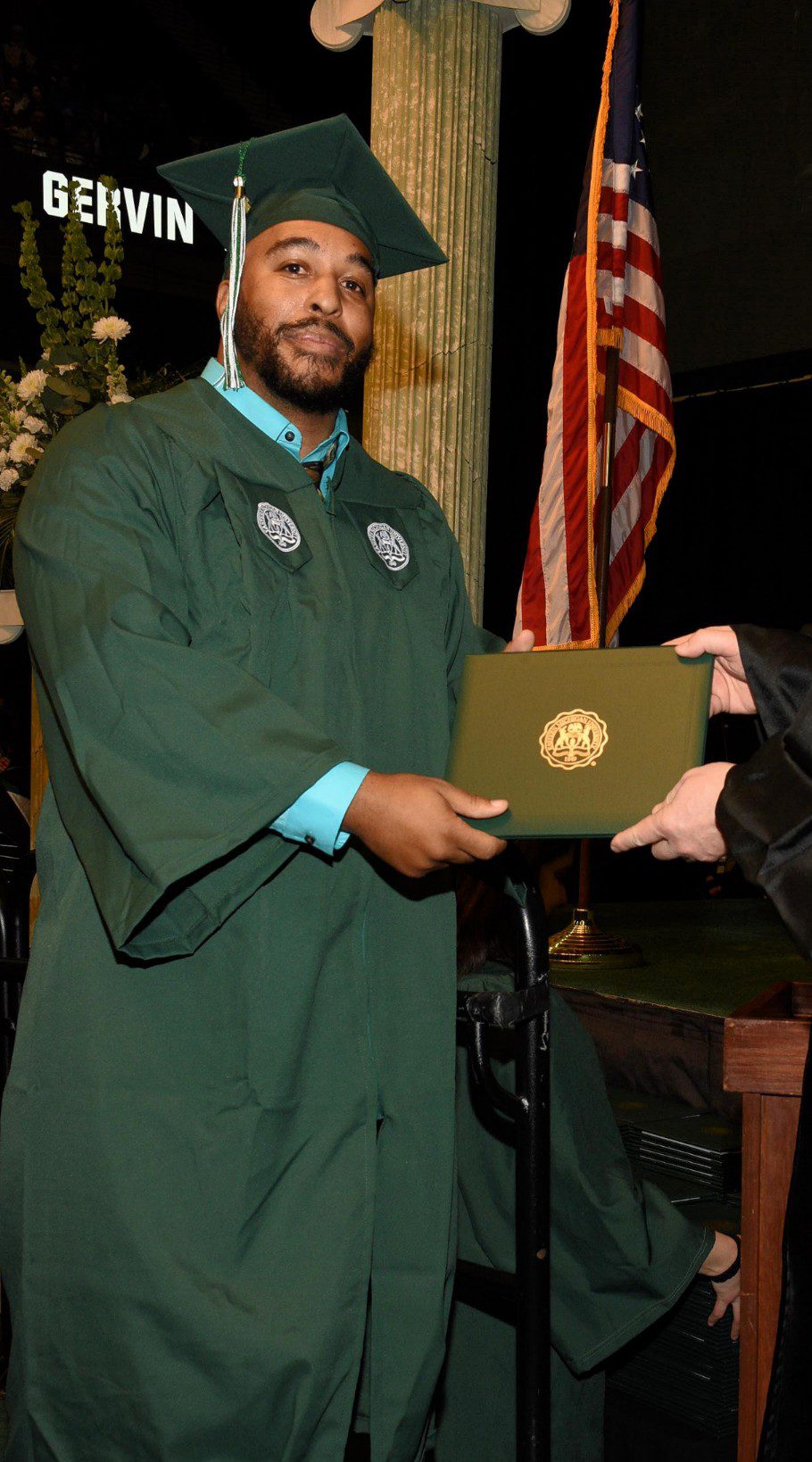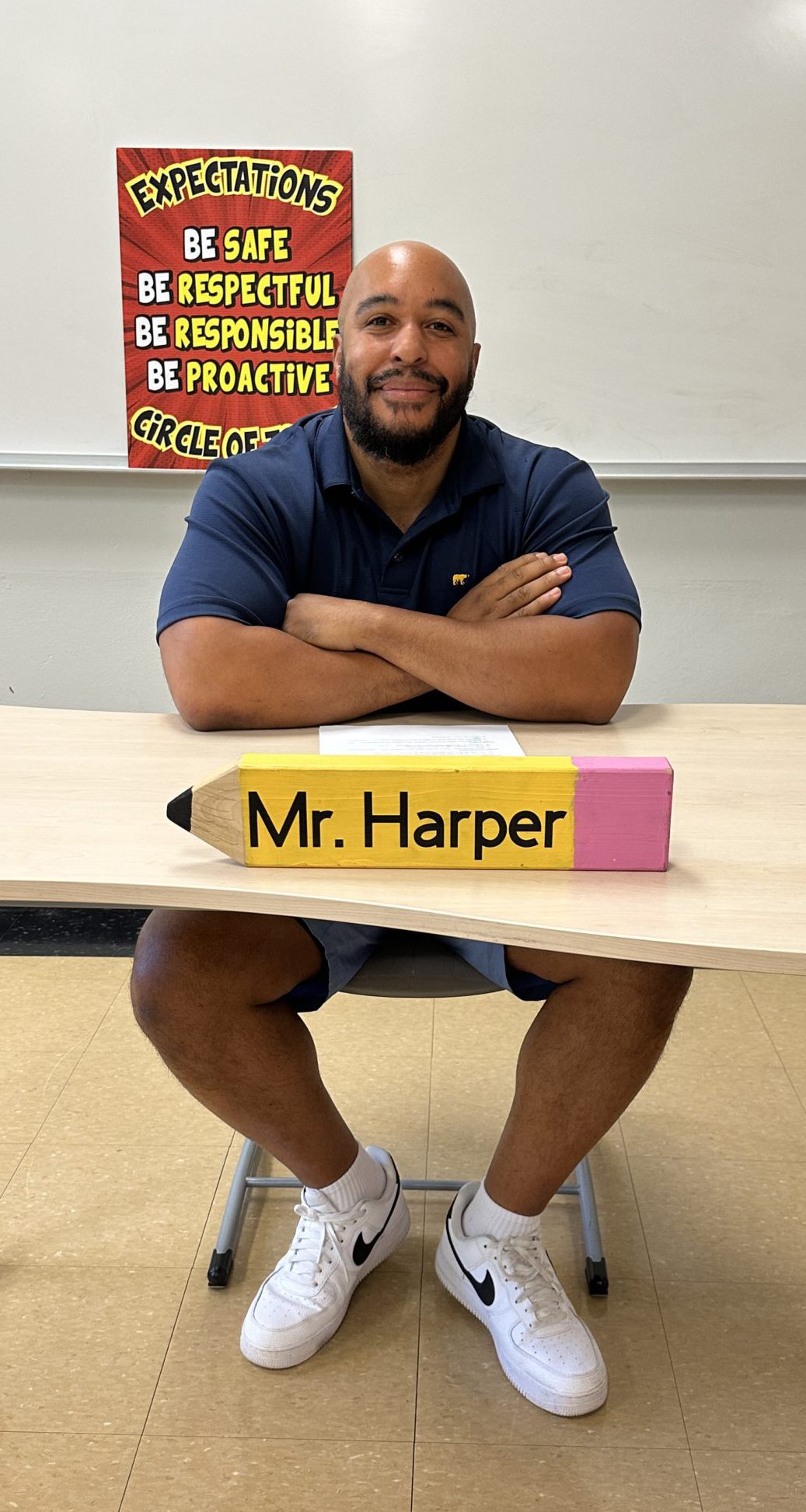In para-to-teacher project, classroom aides level up

By Brenda Ortega
MEA Voice Editor
In June of 2021, MEA member Justin Harper and two co-founders formally launched a free program for youth in the Ypsilanti-Ann Arbor area, focusing on sports as a tool for teaching kids about health and nutrition along with problem-solving and leadership.
Back then Harper was working as a 15-year paraeducator in Ann Arbor Public Schools, supporting both general education and special needs students. He enjoyed the added chance to give kids fun activities wrapped in lessons on values such as community, respect, trust and perseverance.
“I absolutely love sports, but sports is just a hook,” he said. “We really want to teach them about life.”
Begun in response to COVID, the youth wellness program known as Community Leadership Revolution (CLR) Academy continues to offer weekly activities at various sites in the area year-round — even inspiring a duplicate program in Seattle.
A local municipality recognized the powerful impact CLR was making in the community and offered funding to sustain and grow the program. But here’s the topper: Through this same time period, Harper took on another huge commitment that would test his own perseverance.
He joined a cohort of paraeducators who signed on to complete bachelor’s degrees with certification to teach special education — while continuing to work his full-time classroom job.
Over more than three years Harper took night classes alongside other paraeducators in a Grow Your Own project between the Washtenaw Intermediate School District and Eastern Michigan University. Participants worked with mentors and the promise of a teaching job in their home districts.
“After working in schools for so long, I knew this was the direction I needed to go — it felt like a clear part of my purpose and who I was meant to be,” Harper said, adding he had taken classes here and there for years, on and off as finances allowed, in pursuit of a degree.
The partnership between Washtenaw ISD and EMU is one of many across Michigan awarded state grants to offer existing school employees or other community members a no-cost route to initial or additional teacher certifications in high-need areas.
In the WISD program with EMU, now in its fourth cohort, all participants are seeking special education endorsements — a critical need in districts everywhere.
Special education teacher shortages are “pervasive across Michigan,” according to the annual “Michigan Teacher Shortage Study: 2025 Report” by the Education Policy Innovation Collaborative (EPIC) at Michigan State University.
School districts in the study reported higher vacancy rates for special education teachers than any other type of teaching position, with many districts reporting more than 10% of their special education positions vacant. Other areas of high need include math, science and world languages.
“Declines in initial certification for special education teachers persisted longer than those in other subject areas, and, as a result, the incoming supply of special education teachers has not been able to meet the demand,” the report concluded.
Local teacher shortages exist in different parts of the state across all grades and subject areas, with high-poverty urban districts and rural schools facing the most acute shortages, according to the report.
In one response, over the past three fiscal years, the state Legislature and Gov. Gretchen Whitmer allocated $175 million for Future Proud Michigan Educator Grow Your Own staff grants — which to date are helping more than 160 school districts to address their specific staffing shortages.
“These programs are relatively recent and early in their development and implementation,” the MSU-EPIC report said. “It will take time for these efforts to translate into meaningful changes in the state’s educator data.”

Each awarded district — or consortium of districts working together — administers its own free Grow Your Own opportunity in partnership with one or more state-approved educator preparation providers such as universities and colleges or alternative route providers.
An early adopter of the grow-your-own model, the Washtenaw ISD-EMU partnership has now graduated more than 50 special education teachers, and the vast majority of those are settled into their new roles.
In June, Harper finished his first full year as a seventh-grade resource teacher at Slauson Middle School in Ann Arbor after completing his preparation program in December 2023.
“It was a great first year,” he said, though admitting the newness of being a lead teacher with his own caseload of students also was “nerve-wracking,” because “I’m the type of person that puts a lot of pressure on myself to do my best.”
He has wonderful support and mentoring to be successful, Harper added. “You’re always learning and growing in this profession, and that’s what I appreciate most about it. I love to learn. I love being able to improve myself.”
His biggest first-year challenge was one faced by educators across the country: absenteeism. Too many students are missing too many days, making it hard for them to return and feel comfortable in school.
“I try to work with the parents to give them support and resources where I can, or be an ear if necessary, but sometimes there’s more going on,” Harper said. “We don’t have all the control of dynamics that are going on outside of school.”
The best part of his new job was also the best part of his old one: building relationships with students, getting to know their individual needs, and showing them how to be the best person they can be. He learned how to reach kids over the years as a paraeducator.
“I meet them where they are because that opens up a doorway of hope,” he said. “I try to give them support to build them as human beings — to develop character, integrity, discipline, leadership, the things that are going to make them successful in academics and in life.”
It’s work he also continues outside of school in his role as director of CLR Academy, which he still operates with co-founders and sponsors Jamall Buford, program director of Washtenaw My Brother’s Keeper; and Bilal Saeed, co-owner of Association Football Club (AFC) Ann Arbor.
In retrospect, the four years he spent helping to build and run the academy while working full-time and taking classes at night turned out to be a winning combination, Harper said. Each role helped him learn and improve upon his performance in the others.
Even with costs covered for getting a degree and certification, achieving his goal of becoming a teacher took all of the life skills he teaches to young people: discipline, hard work, persistence. It was all worth it, he says.
“I’m very happy. This is what I’m supposed to be doing, and I want to change the world.”
Funding for the program’s future remain unclear. If the decision were up to Harper, many more school employees would get the same chance he did.
“I don’t know if there’s enough words to really express how much it means for me. I feel so blessed and inspired to actually be able to be living my dream right now.”
_________________________________________________________________________
SPECIAL REPORT: Teacher Recruitment
- Introduction / MEA welcomes new educators
- ‘Doing what’s right for the next generation’ / High schoolers explore education careers
- Armada: ‘If you love this, do it’
- Lenawee: ‘There are great rewards’
- In para-to-teacher project, classroom aides level up
- Saginaw apprenticeship a first-of-its-kind
- Rural hub at CMU offers free credentials



